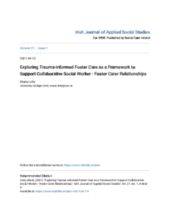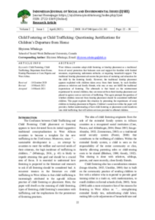Displaying 171 - 180 of 2221
This paper suggests a new framework, Trauma-informed Foster Care that was developed to reflect the experience of the Irish foster care system, may be helpful to support more collaborative practices between foster carers and social workers in an Irish context.
This article explores the concept of care and the responsibility assumed by ‘states’ when taking children into care.
The current study used survival analysis to investigate whether the type of placement (kin versus non-kin) related to the number of placement disruptions over time.
The purpose of this study was to provide a population-based analysis of child protection system (CPS) involvement among children and adolescents who died by suicide.
This paper explores whether children removed from kinship placement should be considered trafficked children by presenting the experiences of some children in kinship placement in Nigeria.
The current study used population-based administrative records from California to assess how CPS responds to reported allegations of IPV, with and without physical abuse and/or neglect allegations.
This study experimentally tested proximal outcomes of Connecting, a low-cost, self-directed, family-based substance-use prevention program for foster families.
The purpose of this study was to examine associations of foster care exit type (e.g., reunification with birth family, adoption, guardianship/permanent relative placement, or emancipation from care) with risk of entry into state prison in the U.S. state of Wisconsin and to examine racial disparities in those associations.
The current study aimed to examine effects of pre-adoptive risk on long-term functioning in children adopted from foster care.
The current study aimed to examine effects of pre-adoptive risk on long-term functioning in children adopted from foster care.


